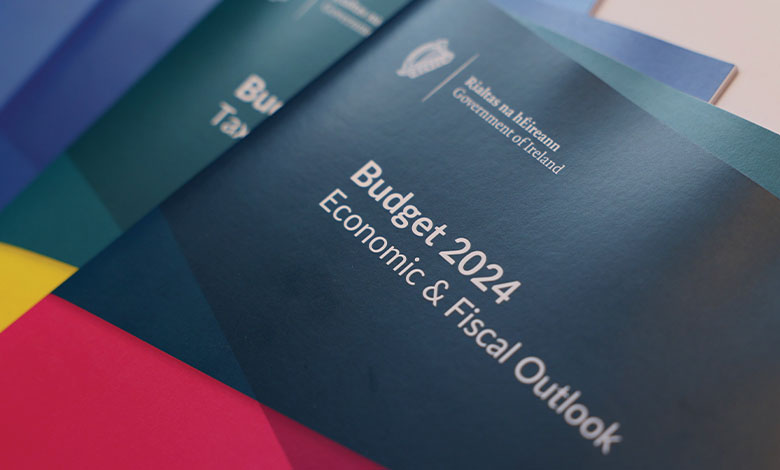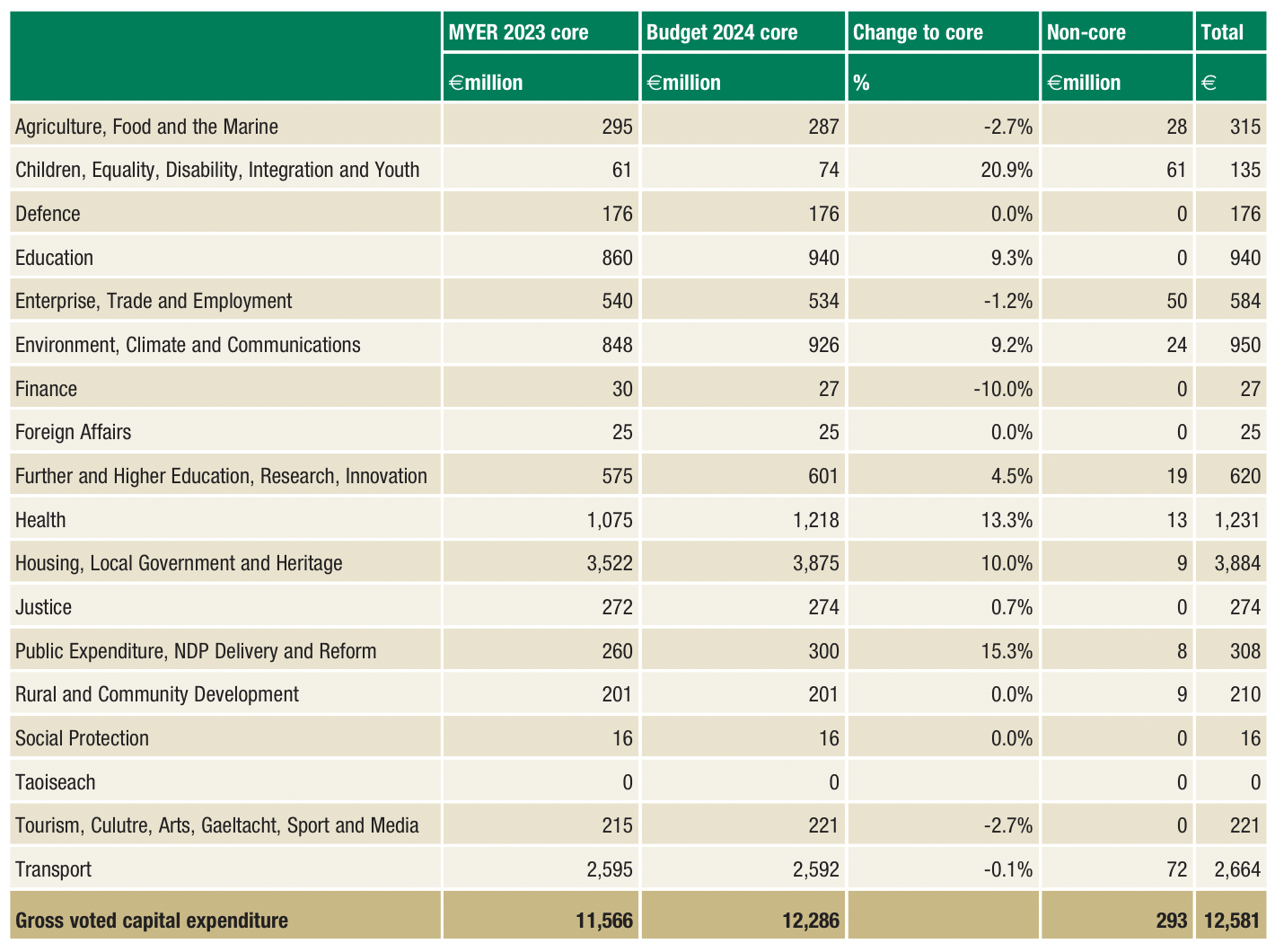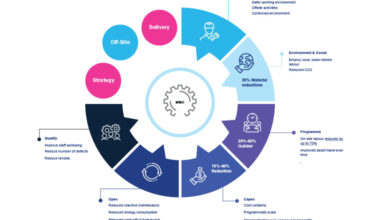Capital expenditure in Budget 2024

Total capital expenditure in Budget 2024 amounts to €12.8 billion, a 7.6 per cent increase on Mid-Year Expenditure Report 2023 levels and a 3.2 per cent increase on Budget 2023 levels as Ireland continues infrastructure spending increases to deliver the National Development Plan.
Ireland’s total capital expenditure of €12.8 billion in Budget 2024 is made up of €12.6 billion in gross voted core capital expenditure as is set out by the National Development Plan (NDP) and €250 million from windfall exchequer receipts “to be allocated to critical infrastructure projects that are at an advanced stage as well as to the existing Climate Action Fund”.
A further €2 billion is being made available across 2025 and 2026 in this regard, significantly boosting effective delivery of capital projects in these areas and other government priorities. Including the €250 million in 2024, this raises the overall increase in capital investment in 2024 to just over 10 per cent above 2023 funding.
With the ESRI predicting that Ireland’s level of inflation for 2023 will be recorded as 6.4 per cent, the level of core infrastructure expenditure provided in Budget 2024 represents an increase of 7.4 per cent from Mid-Year Expenditure Report 2023 (MYER23) levels, but total capital expenditure represents a 3.2 per cent increase from Budget 2023 total capital expenditure levels, when €12.4 billion was made available for infrastructure spending.
In its expenditure report for Budget 2024, the Government states that the increase of “approximately 8 per cent” from MYER23 levels and the subsequent core total of €12.6 billion as being “in line with the NDP” and providing funding for “key investment across sectors including health, housing, education, and transport while also investing in our climate goals”.

Expenditure by department
Of the current 18 government departments, 17 receive capital funding, with only the Department of the Taoiseach receiving none. The Department of Housing, Local Government and Heritage retains its status as the most highly-funded department in terms of capital funding, amid high projections of construction needed to answer the housing crisis that has raged in Ireland for a decade.
The €3.884 billion allocated to the Department is a 10 per cent increase on MYER23 levels and a 10.5 per cent increase on Budget 2023 levels. The capital funding given to the Department accounts for 30.9 per cent of all voted capital funding, an increase on its proportion of 26.7 per cent in Budget 2023.
The departments of transport and health are the second- and third-best funded departments in terms of capital expenditure respectively, with the two and the Department of Housing, Local Government and Heritage being the only three departments to receive over €1 billion in capital funding. Despite this, the Department of Transport’s €2.664 billion in capital funding is a 0.1 per cent decrease on MYER23 levels, but a 1.6 per cent increase from Budget 2023.
The Department of Transport’s capital expenditure budget accounts for 21.2 per cent of all capital expenditure, the same proportion it accounted for in Budget 2023. The Department of Health received an increase of 13.3 per cent compared to MYER23 and a 4.6 per cent increase from Budget 2023, with its total of €1.231 billion accounting for 9.8 per cent of total capital expenditure, a slight increase from the 9.5 per cent it accounted for in Budget 2023.
Of the 17 government departments which receive capital expenditure funding, four received funding cuts compared to MYER23 levels; in comparison, no departments received a cut in funding in Budget 2023. The biggest of these cuts by proportion is the 10 per cent cut to the Department of Finance’s capital expenditure funding, falling from €30 million to €27 million, and the biggest in overall cash terms is the Department of Agriculture, Food and the Marine, whose allocation of €287 million represents an €8 million decrease.
In terms of increases, the largest by proportion was the 20.9 per cent increase allocated to the Department of Children, Equality, Disability, Integration and Youth. The increase of over €300 million allocated to the Department of Housing, Local Government and Heritage is the largest increase in cash terms.
With the ESRI predicting Ireland’s inflation for 2023 to average 6.4 per cent and the IMF predicting 5.3 per cent, eight ministerial vote groups received increases in their funding compared to MYER23 levels, with two departments (Further and Higher Education, Research, Innovation and Science and Tourism, Culture, Arts, Gaeltacht, Sport and Media) receiving increases that fall under both predicted rates of inflation, equating to real terms cuts.
GNI*
The Government has previously pledged to ensure that voted capital expenditure will be at 5 per cent of GNI* by 2025. The GNI* figures of the Central Statistics Office are typically one year behind, meaning that we can compare 2022’s GNI* to Budget 2024, published in 2023, but cannot be certain of how the budget totals compare with current GNI*.
Voted capital expenditure in Budget 2023 stood at 5.3 per cent of 2021’s GNI*. Budget 2024’s voted capital expenditure stands at 4.7 per cent of 2022’s GNI* (€273 billion).
There is a danger of the 2025 target being missed due to pronounced increases in GNI*, with it having increased by 17.1 per cent from 2021 to 2022, or just under €40 billion, having previously had a yearly average increase of €7.3 billion from 2017 to 2021. From Budget 2023 to Budget 2024, capital expenditure will increase by 3.2 per cent in comparison; significant increases to capital expenditure will be needed if the pace of GNI* increases are to be matched.





